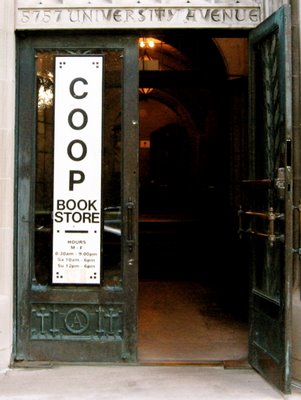(1) Which is the better academic bookstore?
(2) Counting the popular branch of the Co-op (57th street books), which is the better bookstore overall?
Blackwell's has two specialty bookstores across Broad Street from the main shop: an art and poster store, and a music store. I'll count both of those for the purposes of assessing both (1) and (2).
I think it is possible for a bookstore to be a good bookstore overall without being a good academic bookstore. And it's not just possible--it's actually the case that some bookstores are are good overall without being good academically. For example:
-Kramerbooks (D.C.)
-Qi (Oxford)
Both of these are very pleasant places to browse a limited, but thoughtfully chosen and entertainingly arranged selection of books. Both have attached cafes or bars.
To decide between Blackwell's and the Co-op in terms of general quality, features like the following will be important: pleasant atmosphere, a thoughtful selection of books, and arrangements of books that get me to buy things (or at least write things down to check out from the library) I didn't come in looking for.
The criteria for academic quality are different. Since I'm a philosophy student, I will concentrate on the philosophy sections and take them as representative of the academic collections as a whole. I just don't have enough experience with other sections to tell how the astronomy or political sociology or theology sections compare.
Here I will be concerned with a comparison solely in terms of academic quality.
Philosophy Section Size
Both Blackwell's and the Co-op have gigantic philosophy sections. My estimate is that they have nearly the same amount of shelf area devoted to the discipline.
Organization
Blackwell's
There are important differences in the way that Blackwell's and the Co-op organize their philosophy sections. Blackwell's enforces a de facto analytic-continental divide by organizing its philosophy books into subject areas. There are sections for philosophy of science, philosophy of mind, aesthetics, political philosophy, metaphysics, philosophy of language and logic, and ethics. Then there are historical sections, roughly broken down by century, going up to the German Idealists. There is a whole wall of contemporary, or 20th century, European philosophy. That's where you will find all the Foucault and Derrida, as well as the Wittgenstein.
I find this arrangement annoying. Where should you look to find a book like Reasons and Persons? Metaphysics? No. Ethics. What about one of Dennett's books, like Freedom Evolves? Philosophy of science? Metaphysics? Philosophy of Mind? I haven't looked for that book in Blackwell's, but the point is that I wouldn't know immediately where to go. I think I remember seeing the two volumes of McDowell's essays in the philosophy of mind section. That seems odd. This arrangement also has the effect of putting books by the same author in different sections, so you can't, say, see everything they have by David Lewis or Charles Travis by looking in a single place.
One benefit of Blackwell's arrangement is that if you concentrate on a single section (philosophy of language, say), you very quickly spot new titles in that area. So, on my last visit, for example, I spotted two cool-looking new books I didn't know about beforehand: Max de Gaynesford's I and Michael Devitt's Ignorance of Language.
Another benefit is that the Blackwell Companions and Routledge Introductions, and other survey-ish books are separated out from the main sections and grouped together. Zed has complained before about how the Co-op doesn't do this (with the exception of the Cambridge Companions, which are organized together).
One idiosyncratic psychological effect that Blackwell's organization has on me is to make me depressed. I think this is caused by the feeling that I can't keep up with all the new material published in even a subdiscipline of philosophy.

Seminary Co-op
The Co-op has contrasting virtues and vices of organization.
It doesn't separate its philosophy section into areas of philosophy. So you can find McDowell pretty close to Malebranche. Though you do need to know that there is a separate cognitive science section, where you find most of the Dennett and Fodor and the Churchlands, a separate theology section, where all the Kierkegaard is, and a philosophy of science section where you have to go to find Kuhn. So with those exceptions, you can find all the works by an author grouped together--all the David Lewis, all the John Perry. Of course, there is still the problem of knowing where to look for a book like Bernard Williams's Descartes: under Williams, or under Descartes? But that's a general problem for all bookstores. (At the Hyde Park Powells, sometimes they handle this problem by putting one copy of, say, Karen Green's book on Dummett, in the K section and another copy in the D section.)
If you're looking for new books in your area of philosophy, you're pretty much at sea in the Co-op. When Tom Baldwin was visiting, we took him to the Co-op and that was his main complaint about the philosophy section. This strikes me as an expression of the interdisciplinarity championed at the U of C. Good in some ways (I don't get depressed going into the Co-op, looking at a single narrow section of philosophy), but bad in others (it is harder to keep on top of, and so be expert at, a single area).
There is a main table covered in new books of all kinds in the foyer of the Co-op, which is quickly browseable, but also not separated by subject area. Only a small portion of the new books out on the table will be philosophy.
 New books at the Seminary Co-op.
New books at the Seminary Co-op.Used Books
One substantial advantage that Blackwell's has over the Co-op is its used book section. It is obviously the destination for students to sell back their required reading, so they always have multiple copies, some nearly untouched, of commonly assigned books--lots of Descartes, introductions to logic, etc. I've also scored some pretty decent used books there: hardcover 1st editions of Zettel and The Blue and Brown Books, and a paperback copy of Bernard Williams's Descartes (which used to be hard to find, but has been recently reissued).
The Co-op doesn't have a used section, though Powells can be very good and is just a few blocks away. Though Powells doesn't have as much turnover as the used section at Blackwell's.
Other remarks
Though I'm not as familiar with some of the other sections of these bookstores, I do have a sense that the film section at the Co-op is vastly superior to the film selection at Blackwell's.
 The film section at the Co-op
The film section at the Co-opAtmosphere
This is the most response-dependent way of comparing these bookstores, but I prefer the utilitarian, bomb shelter feel of the Co-op to the open and airy atmosphere of Blackwell's. The Co-op is singlemindedly devoted to its books--in the pictures above you can see how there is no space between the books and the ceiling. There is very little space taken up by signs or other displays. I also like that. The books are allowed to call attention to themselves. It encourages a feeling of intense study. The overhead pipes occasionally make a noise that sounds like the ceiling is going to collapse.
Blackwell's has an excellent cafe, where you can sit and read the Observer and have an espresso. The Co-op barely has enough room to squeeze by other customers. That, for whatever reason, adds to the charm of the Co-op as an academic bookstore.
Finally, the Co-op has the edge in hours of operation. Blackwell's closes at the ridiculously early time of 6pm on weekdays. The Co-op is open until 9.
 Co-op hours of operation
Co-op hours of operationStaff
My experience with the staff at Blackwell's has been mixed. Most of the time they know where stuff is, but they are never exceptionally friendly, and a few times they've pointed me in the wrong direction.
In contrast, the staff at the Co-op are exceptionally good--they know exactly where everything is, and are always willing to track things down for me, rather than just saying something like "I think it's in the music section". And they have even read, or at least looked through, some of the books they are selling. One guy who works at the Co-op pointed out this picture, buried in the middle of the recent H.L.A. Hart biography, to me while I was walking around browsing.
Summary
So, let me review the points in favor of each bookstore:
Size of collection: tie
Organization: Blackwell's gets a point for focus; the Co-op gets a point for avoiding parochialism
Used books: Blackwell's
Atmosphere: The Co-op
Hours: The Co-op
Staff: The Co-op
I therefore conclude that the best academic bookstore in the English speaking world is the Seminary Co-op.


No comments:
Post a Comment